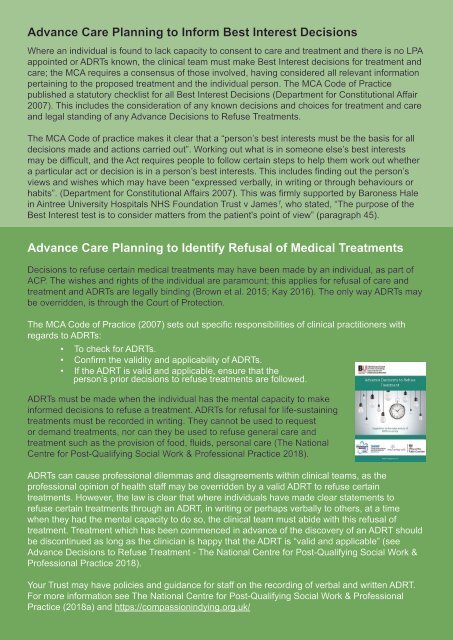Advance Care Planning
Advance care planning is a process that supports adults at any age or stage of health in understanding and sharing their personal values, life goals, and preferences regarding future medical care. The goal of advance care planning is to help ensure that people receive medical care that is consistent with their values, goals and preferences during serious and chronic illness.
Advance care planning is a process that supports adults at any age or stage of health in understanding and sharing their personal values, life goals, and preferences regarding future medical care. The goal of advance care planning is to help ensure that people receive medical care that is consistent with their values, goals and preferences during serious and chronic illness.
Create successful ePaper yourself
Turn your PDF publications into a flip-book with our unique Google optimized e-Paper software.
<strong>Advance</strong> <strong>Care</strong> <strong>Planning</strong> to Inform Best Interest Decisions<br />
Where an individual is found to lack capacity to consent to care and treatment and there is no LPA<br />
appointed or ADRTs known, the clinical team must make Best Interest decisions for treatment and<br />
care; the MCA requires a consensus of those involved, having considered all relevant information<br />
pertaining to the proposed treatment and the individual person. The MCA Code of Practice<br />
published a statutory checklist for all Best Interest Decisions (Department for Constitutional Affair<br />
2007). This includes the consideration of any known decisions and choices for treatment and care<br />
and legal standing of any <strong>Advance</strong> Decisions to Refuse Treatments.<br />
The MCA Code of practice makes it clear that a “person’s best interests must be the basis for all<br />
decisions made and actions carried out”. Working out what is in someone else’s best interests<br />
may be difficult, and the Act requires people to follow certain steps to help them work out whether<br />
a particular act or decision is in a person’s best interests. This includes finding out the person’s<br />
views and wishes which may have been “expressed verbally, in writing or through behaviours or<br />
habits”. (Department for Constitutional Affairs 2007). This was firmly supported by Baroness Hale<br />
in Aintree University Hospitals NHS Foundation Trust v James<br />
1, who stated, “The purpose of the<br />
Best Interest test is to consider matters from the patient's point of view” (paragraph 45).<br />
<strong>Advance</strong> <strong>Care</strong> <strong>Planning</strong> to Identify Refusal of Medical Treatments<br />
Decisions to refuse certain medical treatments may have been made by an individual, as part of<br />
ACP. The wishes and rights of the individual are paramount; this applies for refusal of care and<br />
treatment and ADRTs are legally binding (Brown et al. 2015; Kay 2016). The only way ADRTs may<br />
be overridden, is through the Court of Protection.<br />
The MCA Code of Practice (2007) sets out specific responsibilities of clinical practitioners with<br />
regards to ADRTs:<br />
• To check for ADRTs.<br />
• Confirm the validity and applicability of ADRTs.<br />
• If the ADRT is valid and applicable, ensure that the<br />
person’s prior decisions to refuse treatments are followed.<br />
ADRTs must be made when the individual has the mental capacity to make<br />
informed decisions to refuse a treatment. ADRTs for refusal for life-sustaining<br />
treatments must be recorded in writing. They cannot be used to request<br />
or demand treatments, nor can they be used to refuse general care and<br />
treatment such as the provision of food, fluids, personal care (The National<br />
Centre for Post-Qualifying Social Work & Professional Practice 2018).<br />
ADRTs can cause professional dilemmas and disagreements within clinical teams, as the<br />
professional opinion of health staff may be overridden by a valid ADRT to refuse certain<br />
treatments. However, the law is clear that where individuals have made clear statements to<br />
refuse certain treatments through an ADRT, in writing or perhaps verbally to others, at a time<br />
when they had the mental capacity to do so, the clinical team must abide with this refusal of<br />
treatment. Treatment which has been commenced in advance of the discovery of an ADRT should<br />
be discontinued as long as the clinician is happy that the ADRT is “valid and applicable” (see<br />
<strong>Advance</strong> Decisions to Refuse Treatment - The National Centre for Post-Qualifying Social Work &<br />
Professional Practice 2018).<br />
Your Trust may have policies and guidance for staff on the recording of verbal and written ADRT.<br />
For more information see The National Centre for Post-Qualifying Social Work & Professional<br />
Practice (2018a) and https://compassionindying.org.uk/



